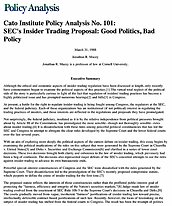At present, a battle for the right to regulate insider trading is being fought among Congress, the regulators at the SEC, and the federal judiciary. Each of these organizations has an institutional (if not political) interest in regulating the trading practices of insiders, and those interests are reflected in the regulations and proposals they have promulgated.
Not surprisingly, the federal judiciary, insulated as it is by the relative independence from political pressures brought about by Article III of the Constitution, has promulgated the most sensible–though not thoroughly sensible–rules about insider trading.[4] It is dissatisfaction with these rules among powerful political constituencies that has led the SEC and Congress to attempt to abrogate the clear rules developed by the Supreme Court and the lower federal courts over the last several years.
With an aim of exploring more deeply the political aspects of the current debate on insider trading, this essay begins by examining the political implications of the rules on this subject that were generated by the Supreme Court in Chiarella v. United States[5] and Dirks v. Securities and Exchange Commission[6] and clarified in a series of lower court decisions. These two decisions brought both clarity and coherence to the law of insider trading, which previously had been a bog of confusion. The decisions also represented major defeats of the SEC’s concerted attempts to use the rules against insider trading to advance its own bureaucratic ends.
Powerful special-interest constituencies of Congress and the SEC were dissatisfied with the rules generated by the Supreme Court. Their dissatisfaction led to the promulgation of the SEC’s recently proposed compromise statute, which purports to define the crime of insider trading for the first time.[7]
The proposed statute reflects the interests of those constituencies rather than the proffered public-interest goal of protecting the “fairness, efficiency and integrity of the Nation’s securities markets.”[8] Judge-made law of insider trading evolved from the enactment of SEC Rule 10b‑5 to the Supreme Court’s decisions in Chiarella and Dirks.[9] The courts gradually moved from vague, incoherent “fairness” justifications of insider trading law toward precise, intellectually defensible contract-based justifications of such law. Recently, however, the locus of lawmaking on the subject of insider trading has shifted from the federal courts to Congress. The result has been the triumph of politics over principle.


